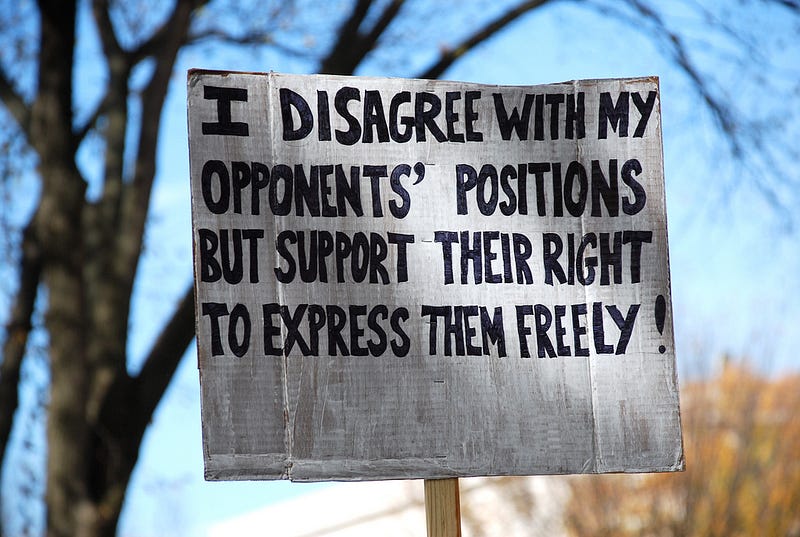
Photo courtesy of Flickr / Adam Fagen
I am writing this article to address what I view as problematic discourse on our campus. Before delving into my argument, I would like to recognize that I am a straight, white, cis, financially comfortable male. I speak from a place of immense privilege and I think it would be inappropriate to ignore that fact when entering into the sphere of public discussion. With that said, I see three evident problems that permeate discourse on campus and I will explain each of them in detail.
First, arguments are often made without appropriately addressing the larger issues of which they are a part. An example of this is when an argument focuses solely on rhetoric used in a discussion concerning marginalized groups. There is no inherent problem in addressing the specific details of any discussion (or argument, movement, etc.), but focusing attention on those details without regard for the overarching, and undoubtedly more important, issues that are the intended foci of the discussion ignores essential context.
If I were to make a post on social media expressing my discontent with specific language used in a Women’s March speech without at least briefly mentioning my viewpoint on the March itself, I would be guilty of drawing attention away from the issues of real importance. Choosing to focus exclusively on the language used in a speech while neglecting to address the goals of the march would suggest that I care more about the minutiae of the march than its actual impact.
Furthermore, with such a post, I would be effectively ignoring the daily oppression women face. Arguments concerning the oppression of marginalized groups that neglect to recognize the pain and struggle resulting from marginalization trivialize the experiences and suffering of our peers.
The second problem evident in campus discourse is something I will refer to as “combative voices.” These combative voices end conversations before they begin, as they demonstrate hatred and a lack of empathy and are simply unkind.
Before giving examples, I want to draw a sharp distinction between combative voices and passionate voices. I recognize that those who argue passionately or even angrily are often criticized for their demeanor. I vehemently disagree with these criticisms. Passion is an essential part of discourse in any sphere. Without passion, I feel that meaningful discussion is hardly possible. Combative voices are a problem because they extinguish conversations; passionate voices do not.
I see many examples of combative voices on social media and in conversation. The two main manifestations of combative voices are name-calling and direct demands to end conversations. Name-calling occurs on social media as well as in conversation, while demands to end discussions seem only to occur on social media. I have personally seen and heard many instances of Hamilton students calling other students, whose arguments they disagree with, inappropriate and nasty names. On social media, I have watched these comments get many “likes,” and in conversations, I rarely hear criticisms of this name-calling; I am often silent myself.
Direct demands to end discussions on social media are easily identifiable, as they specifically state that a conversation should be stopped regardless of any progress that may have been made. Examples of these demands are, “Shut the fuck up,” or “How about you educate yourself before talking to me.” It is worth noting that I take no issue with someone ending a conversation because they are genuinely uncomfortable. Combative voices, however, terminate conversations because of an obvious unwillingness to understand opposing viewpoints.
This is unquestionably not an effective way to engage our peers. The name- calling and demands to end conversation that characterize combative voices are condescending, rude, and hurtful, but most importantly, they severely stifle discourse on our campus. Additionally, they target specific members of our community in inappropriate ways. This leads to the third problem I will address regarding discourse at Hamilton.
This final problem is the conflation of arguments with those who make them. Appropriate discourse surrounding any issue on campus should focus on the arguments that are being made without vilifying our peers who present them. While members of our community often do make this distinction, I have seen numerous cases in which those who present even somewhat controversial opinions endure attacks on their characters. This is unacceptable, as it discourages free expression of thought. We should foster spaces where our arguments can be contested without leading to attacks on our characters.
When I mentioned to various friends that I planned to write an article in
The Spectator
about problematic discourse on campus, almost every one of them asked why I would make myself vulnerable to attack. While these responses were reasonable given the climate surrounding discourse on our campus, they indicate the very problem I am addressing. No one was worried about my argument being attacked; they feared a condemnation of my character.
It seems to me that many students on this campus are afraid to publicly express their viewpoints for fear of enduring assaults on their respective moralities. Whether these attacks occur in conversations, on social media, or in school publications, the threat is real, and the fear is palpable. Given what seems to be widespread apprehension about open and honest discussions on campus, I believe that we, as Hamilton College students, need to reform the ways in which we approach discourse.
If progress is to be made concerning any issue on campus, we need to have meaningful, productive conversations. These conversations begin with listening and empathy. Ignoring essential context, shutting down discussions, and attacking the characters of our peers who publicly share their opinions stifles discourse. Everyone has the common desire to be heard, understood, and treated with respect. The current discourse on our campus does not consistently respect these desires, but we have the power to change that. Prioritizing listening and empathy will enable us to effectively and respectfully engage in constructive dialogue. This form of discourse, regardless of our goals, is the key to our success.
